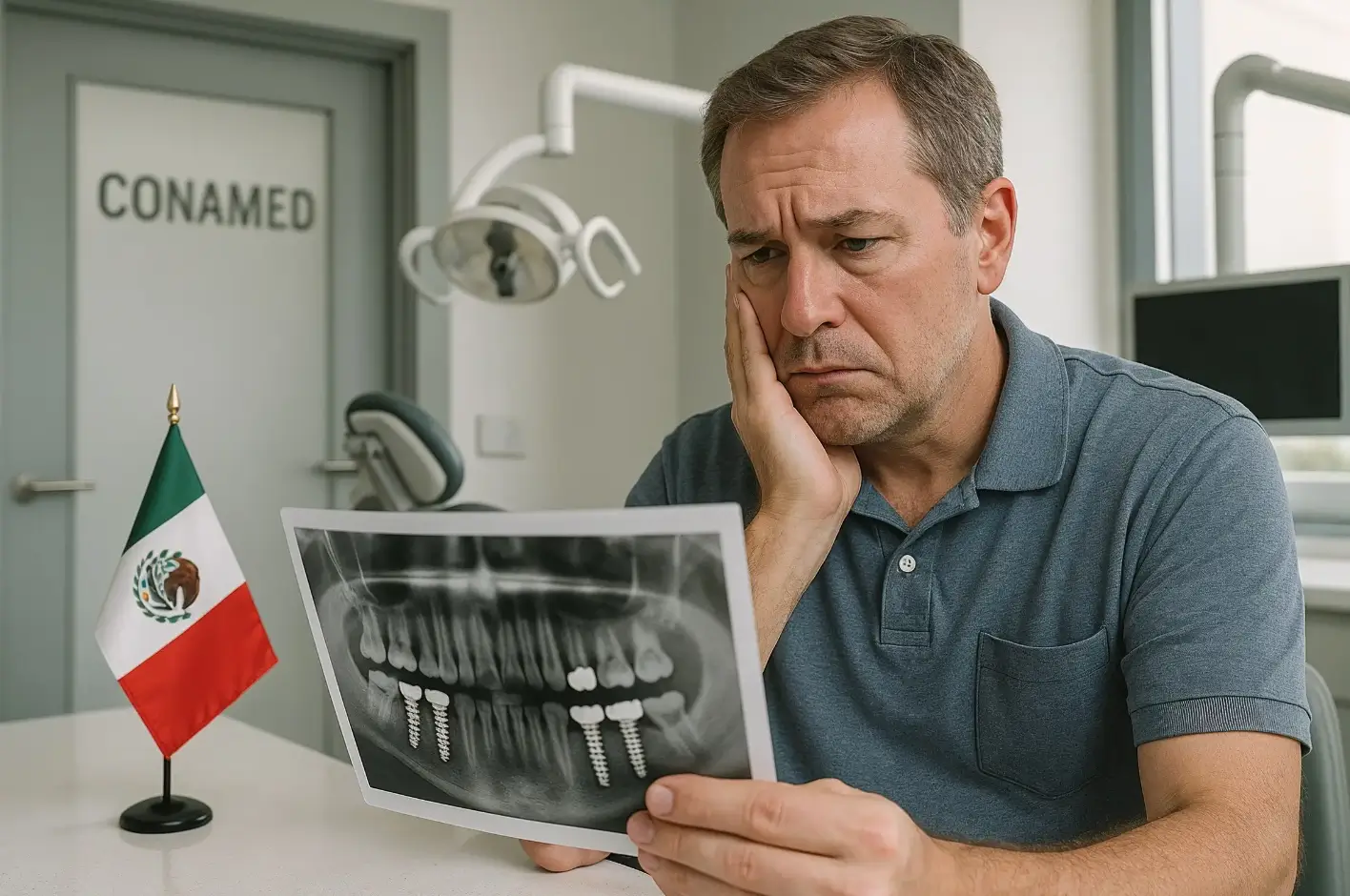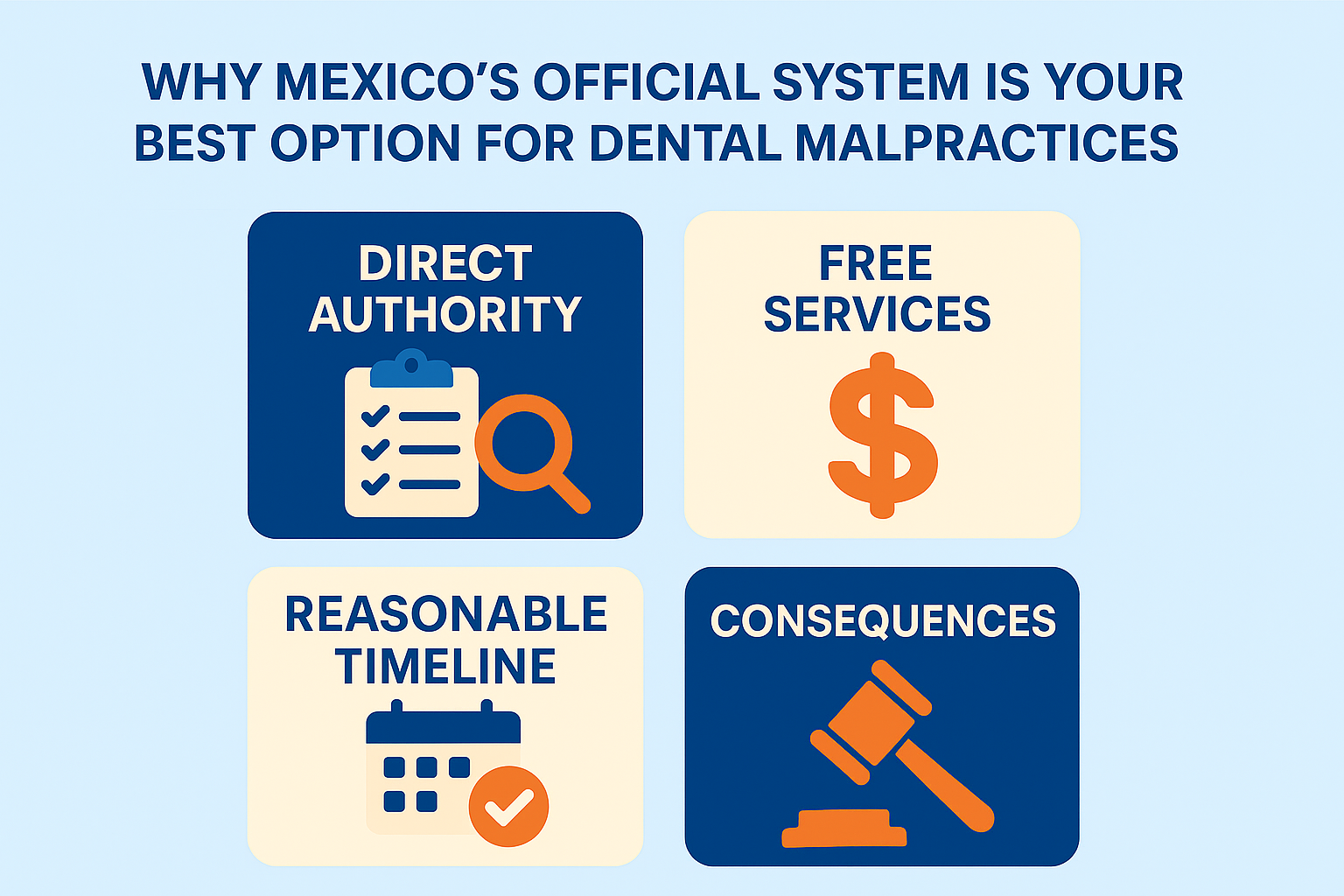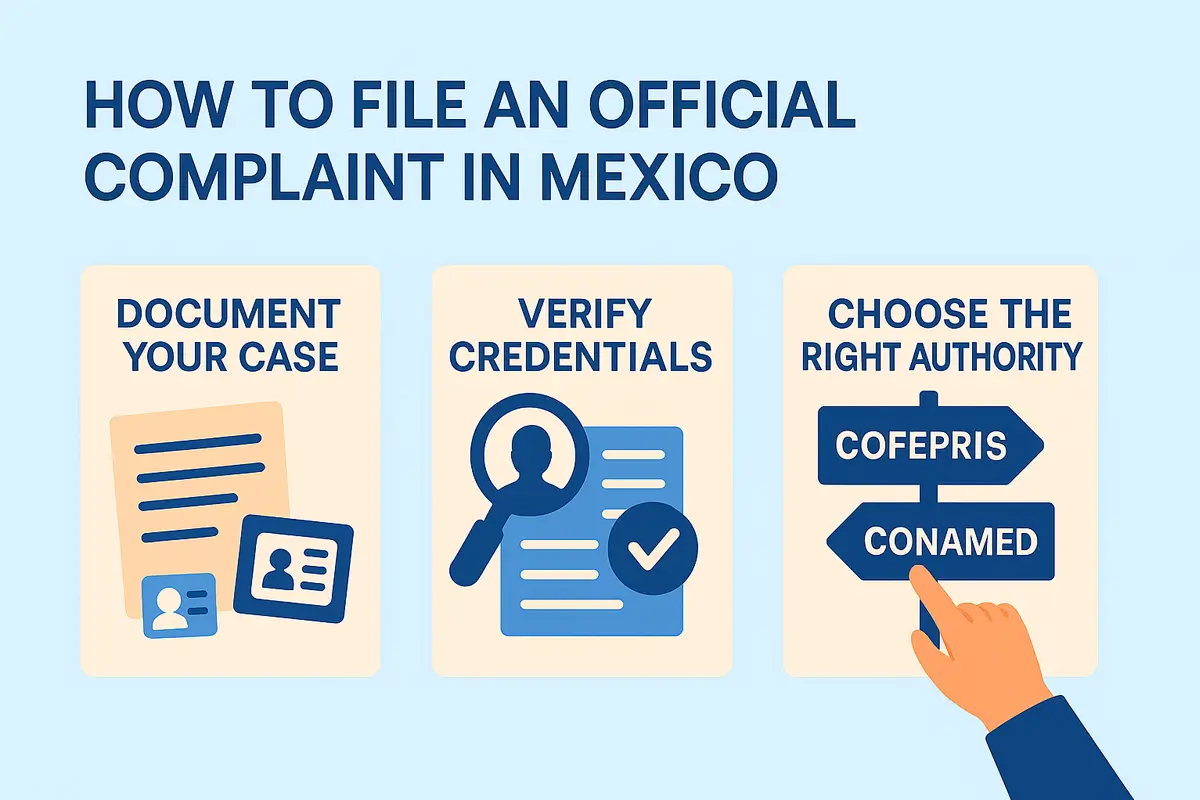Trust
Bad Dental Work in Mexico? File an Official Complaint
September 22, 2025

Back to Blog

You might have saved a lot on dental work in Mexico. The clinic seemed professional, the reviews looked good, and the price was great. Most of the time, when patients do their research carefully, treatment goes smoothly. That is why Mexico has become one of the leading destinations for dental tourism.
However, if complications arise, such as infections, failed implants, poor sanitary practices, or discovering that a dentist is unlicensed, these are not minor inconveniences. They are serious problems that can be formally reported through Mexico’s official complaint system, whether through CONAMED’s medical complaint process for conciliation, CONAMED’s arbitration procedure for binding resolution, or a sanitary complaint with COFEPRIS if unsafe conditions are involved. In many cases, these reports can carry legal implications for the clinic or the doctor involved.
This guide will walk you through Mexico’s official complaint channels. Often the most effective, and sometimes the only, way to hold negligent clinics or doctors accountable.
→ At the end, you’ll also find a complete list of official resources and links you may need to file your complaint.

If you are a dental tourist, Mexico’s healthcare system gives you a practical and enforceable way to resolve problems. It is set up to handle complaints quickly, fairly, and for free.
Mexico’s system gives patients a clear and reliable way to hold clinics accountable. This is something private legal action in another country rarely offers.
Before walking through the steps of filing a complaint, it is important to understand how Mexico’s healthcare oversight system operates and the authority these organizations have to support patients.
The Comisión Nacional de Arbitraje Médico (CONAMED) is Mexico’s main agency for settling disputes between patients and healthcare providers. It offers a clear process that includes:
Each state operates its own “Comisión Estatal de Arbitraje Médico”, which coordinates with CONAMED. These state-level commissions often respond more quickly to cases tied to local clinics, providing patients with both federal and regional avenues for resolution.
Mexican healthcare law provides strong protections that reinforce the complaint process:
Professional licensing: All dentists must hold a valid cédula profesional (professional license). Practicing without one is a criminal offense known as usurpación de profesión (impersonation of a profession).
All of these protections work together to create a system that puts patients first, combining arbitration, regulation, and legal safeguards.

Mexico’s oversight agencies and laws protect patients, including international visitors. Here’s how to organize your case and decide the right complaint path.
Creating a strong record is the foundation of any complaint. Mexican authorities formally require certain documents when you file with CONAMED or submit a Denuncia Sanitaria (sanitary complaint) to COFEPRIS. Adding extra evidence will further strengthen your case.
Official requirements (per CONAMED and COFEPRIS):
Best practices to strengthen your case:
Thorough documentation ensures you meet the official requirements and also presents a persuasive, well-organized case that authorities are more likely to act on quickly.
Confirm that your dentist and clinic were legally authorized to treat you. Mexican law requires providers to be properly licensed, and clinics must meet sanitary regulations.
Official requirements:
Best practices:
After preparing documentation and verifying credentials, proceed depending on who you are filing against.
If the problem is with the facility rather than the dentist’s treatment, you can report issues such as:
Submit a Denuncia Sanitaria (sanitary complaint) to COFEPRIS or your state’s health authority. Authorities can respond with inspections, fines, or even temporary or permanent closure of the clinic, as permitted by law.
For disputes directly tied to the dentist’s care quality:
Mexico’s oversight systems can help you avoid problems, not just solve them. By checking a few important things before your treatment, you can reduce your risk.
Doing all this on your own can be overwhelming, especially in another country. That’s why many U.S. patients choose Globalcare. With Globalcare, every clinic in our network has already been verified for licenses, sanitary paperwork, regulatory compliance, and complaint history. In other words, all the due diligence is done for you, so that instead of worrying about paperwork and standards, you can focus on your treatment with complete confidence.
CONAMED offers free orientation services (primarily in Spanish), which can help you understand the process. If you don’t speak Spanish, hiring a translator is wise so your documents are accurate and nothing gets lost in translation.
It varies. Studies show conciliation averages about 171 days, while arbitration averages around 286 days. Simple cases may close faster; complex ones that require expert review may take longer.
Yes. If both sides agree to arbitration, CONAMED can issue a binding decision called an arbitral award. This decision is final and cannot be re-litigated. If the provider refuses to comply, you can take the award to a Mexican court to have it enforced.
You can still proceed. Complaints against individual practitioners remain valid, and arbitral awards can be enforced in court. For facility issues, file a sanitary complaint so that regulators can take action, regardless of the clinic’s status.
Usually not. You can file online with CONAMED or COFEPRIS. Some arbitration hearings may be conducted via videoconference; in-person attendance is rarely required.
The stronger your evidence, the stronger your case. At a minimum, include:
Waivers do not exempt providers from complying with Mexican law or official standards. Violations of NOM-013 (oral health/infection prevention) or NOM-004 (clinical records) can still lead to sanctions and compensation orders.
Repeated, substantiated complaints can escalate consequences, ranging from conciliation settlements and required training to suspension of sanitary permits for clinics, or, in cases of fraud/unlicensed practice, criminal prosecution.
Get in touch to get started!
Our team of experts will ensure your all-on-4 dental implants journey is safe and easy. We're dedicated to guiding you to your new smile every step of the way!
ConnectConcierge Services

Trusted Dentists

Safe Locations

Concierge Services

Trusted Dentists

Safe Locations

Disclaimer: Dental Cost Estimation Calculator
This Dental Cost Estimation Calculator is designed to provide users with estimates of potential savings when seeking dental treatments abroad compared to the cost of similar procedures in the United States. However, please be aware of the following important information before using this tool:
1. Estimations Based on Publicly Available Data:
The estimates provided in this calculator are derived from publicly available data sources, including average procedure costs, exchange rates, and other relevant information. These figures may not reflect the exact costs of your specific treatment or location. Estimations include non-dynamic assumptions for travel and lodging costs that may not reflect the actual costs at the time of your research.
2. Quantitative Model Assumptions:
The calculations are based on assumptions and data inputs that may not account for all factors influencing dental treatment costs. Variations in individual treatment needs, dentist fees, and other variables can significantly affect the final expenses.
3. No Substitute for Professional Advice:
This tool is not a substitute for professional dental advice. Before making any decisions about your dental treatment, it is crucial to consult with a qualified dental professional who can provide you with a personalized assessment of your needs and potential costs.
4. Currency Exchange Rates:
Estimates involving foreign treatment costs rely on currency exchange rates, which can fluctuate. The rates used in this calculator may not accurately represent the current market rates at the time of your treatment.
5. Geographic and Facility Variations:
Dental costs can vary significantly based on geographic location, dental facility, and the complexity of the procedure. The estimates provided are general in nature and may not reflect the specific conditions in your chosen destination or dental clinic.
6. Non-Inclusive Costs:
This calculator may not account for additional expenses such as per diem costs in destination or unforeseen complications during or after the procedure. These costs can substantially impact your overall expenses.
7. Liability Waiver:
By using this calculator, you acknowledge that the estimates provided are for informational purposes only, and Globalcare Network Inc or any of its representatives bear no responsibility for the accuracy of the estimates or any decisions made based on them.
8. Independent Research Recommended:
It is strongly recommended that you conduct independent research, obtain quotes from dental professionals, and consider all relevant factors when making decisions about dental treatment abroad.
In summary, while this Dental Cost Estimation Calculator aims to provide helpful information, it should not be the sole basis for your decision-making process. Your individual circumstances and dental needs may differ, and it is essential to seek professional advice and conduct thorough research before pursuing dental treatment abroad